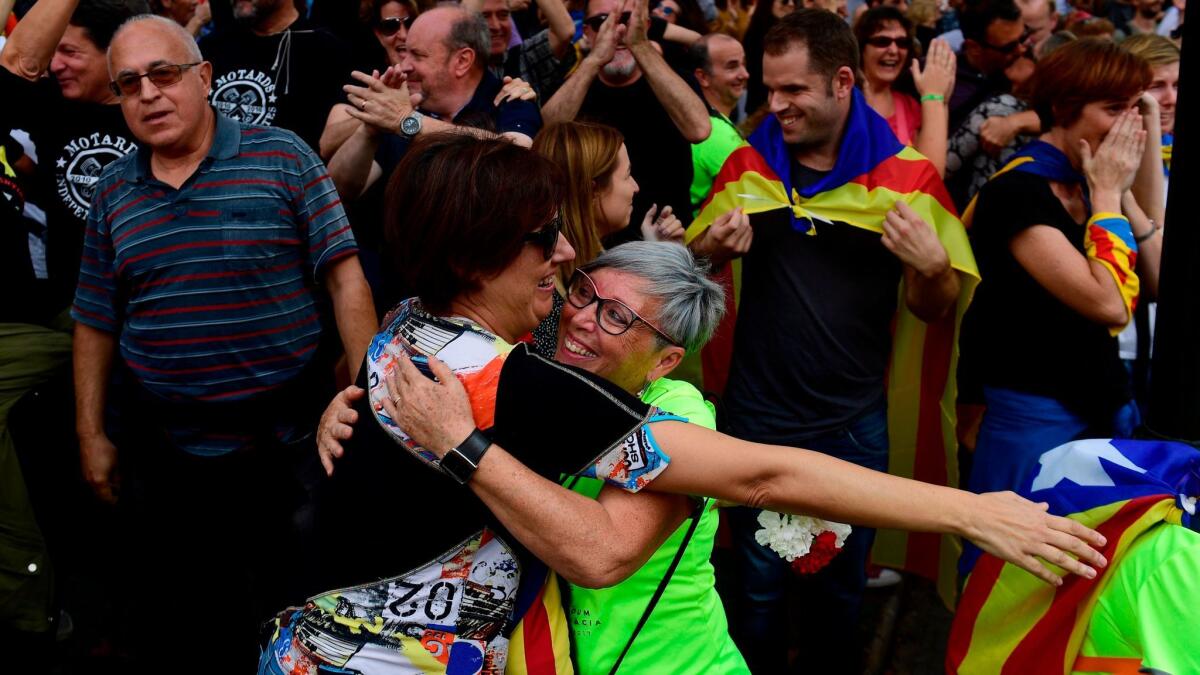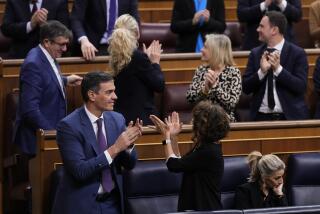In Catalonia, a declaration of independence brought dancing and tears of joy, but also worry

- Share via
Reporting from Barcelona, Spain — When Catalonia’s parliament declared independence from Spain on Friday, a cheer of “We’re a republic!” went up among hundreds of independentistas gathered in Barcelona, the region’s capital.
People in the crowd waved Estelada flags, tossed confetti, popped champagne or local Estrella Damm beers and sang the Catalan national anthem “Els Segadors” (The Reapers), composed in 1899.
“Catalonia triumphant shall again be rich and bountiful. Drive away these people who are so conceited and so arrogant,” they sang. “Just as we cut golden ears of wheat, when the time comes, we cut off chains.”
The independence supporters wore photos of two jailed activists — Jordi Cuixart and Jordi Sánchez — known as “Los Jordis,” yellow ribbons and stickers that said “democracy.”
Jordi Soler, 69, however, was initially speechless. Sitting on a park bench, he began to cry. Finally, he repeated: “They approved it!”
For many residents, the moment was surprisingly emotional, prompting substantial joy but also fear of an uncertain future as Spanish officials vowed to prevent the northeastern region from breaking away.
Soler, a ceramic artist, thought about his family, forced into exile in Mexico during the 40-year rule of dictator Gen. Francisco Franco, who died in 1975. He spent part of his childhood in Mexico City, then returned to Catalonia, where he still felt at times like a stranger.
“We were always in the minority,” in Spain, he said, but in a Catalonian state, “Now we are a majority.”
Pedro Marquez, 65, also grew up under Franco, forbidden to speak Catalan in school or in public. When he served in the army, fellow soldiers made him feel he didn’t belong.
“They told me ‘You’re not Spanish, you don’t speak Spanish’,” the retired math professor said as he stood among others independence supporters wrapped in Estelada flags.
Marquez recalled taking to the streets when Franco died, hoping for democracy. Now here he was again, gray-haired but resolved.
“We’re not afraid. We’re not going to return to Francoism,” he said.
Gloria Vicente, 64, and her 31-year-old son toasted with Champagne in plastic cups.
“We struggled against Spain,” she said. “We want to have our rights: for our economy, our language, our culture.”
Vicente said her main concern in coming days was that protesters like her son could be beaten and jailed indefinitely.
Several people said they worried about what might come next. Many expected Prime Minister Mariano Rajoy to announce, as he went on to do later Friday, that the central government was firing the region’s separatist leaders, dissolving its parliament and calling new elections for December.
Those who opposed independence feared such a change could lead businesses to flee — some already have — and they hoped Spain would act fast to reestablish order. The referendum result easily favored independence, officials said, but less than half of the region’s eligible voters participated.
Business student Refi Kasmadjian, 27, stopped his bicycle when independence was declared and looked at his phone. He noticed a Whatsapp group Catalan and Spanish friends had created to discuss the political crisis had exploded with comments — most were upset. Some wrote, half jokingly, “Send the army already!”
“It’s going to hurt us. It’s pride over reason,” he said of independence.
A friend from Italy compared the declaration to what is known as Brexit, Britain’s decision to exit from the European Union, while Kasmadjian’s brother Armen Kasmadjian, 34, called it “a fiasco.”
Nevertheless, many in the Barcelona crowd near parliament considered the independence moment historic.
Mario Aguilo, 51, and his 9-year-old son Marcel joined the crowd after the declaration and watched on an enormous monitor as the Spanish flag was removed from a government building to the north in Girona and replaced with the striped flag of Catalonia.
Around them, many people were still cheering.
“This is like the Berlin Wall coming down, a new movement not just here, but in Europe,” Aguilo said, “a peaceful revolution.”
Twitter: @mollyhf
More to Read
Sign up for Essential California
The most important California stories and recommendations in your inbox every morning.
You may occasionally receive promotional content from the Los Angeles Times.










